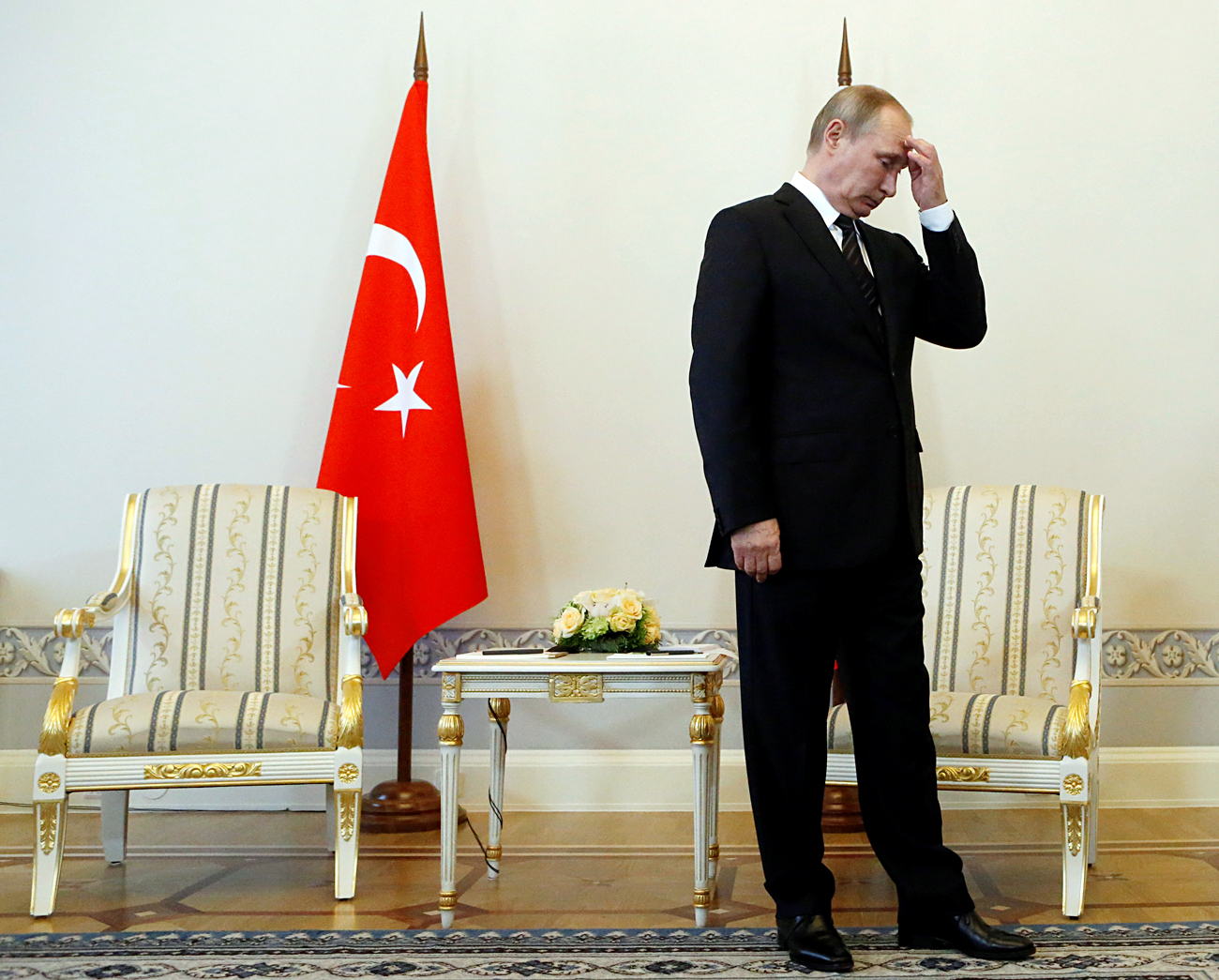Difficult for Russia & Turkey to be strategic partners

Russian President Vladimir Putin attends a meeting with Turkish President Tayyip Erdogan in St. Petersburg, Russia, August 9, 2016
ReutersThe rapprochement between Russia and Turkey seen during the summit in St. Petersburg should not engender unrealistic expectations. There are still many problems and serious contradictions in relations between Moscow and Ankara for there to be, as some commentators are saying, a "strategic alliance" between Russia and Turkey.
The primary problem is the diametrically opposed position both countries hold on the Syrian conflict. Russian President Vladimir Putin supports the regime of Bashar al-Assad while Turkey’s President Recep Tayyip Erdogan is trying to have him overthrown. That remains unchanged. Ankara also has not stopped backing Syrian opposition units, those who are now advancing on Aleppo and who are being bombed by Russia's aircraft. We need to recall that contradictions on Syria led to the unprecedented crisis in bilateral relations, after the downing of the Russian bomber in November last year. These contradictions persist.
The second problem is also related to the Syrian Crisis: the Kurds. For Ankara, the Kurdish units in Syria fighting against the Islamist radicals and terrorists are opponents, separatists and accomplices of the "terrorists" from the Kurdistan Workers' Party, against whom Erdogan is waging war. For Moscow, the Syrian Kurds are potential allies. Moscow has also had special relations with the Turkish Kurds, whom it does not consider enemies.
The third relates to the Armenian-Azeri conflict. Despite all its statements and equidistance, Moscow is perceived in the world as Armenia's potential ally, since they are both members of the Collective Security Treaty Organization. Turkey does not even try to show objectivity and impartiality. Ankara is unequivocally on Baku's side.
The fourth issue concerns the post-Soviet space. Ankara holds a stable position in the Turkic republics of the former USSR (besides Azerbaijan, there is Uzbekistan, Kazakhstan, Kyrgyzstan and Turkmenistan) and is thus, for Moscow, a geopolitical competitor. A particular and painful issue is Turkey's penetration into the "brotherly" Turkish-language republics of the Russian Federation.
The fifth problem is that organizations that are openly hostile to Moscow, like the Crimean Tatars and those from the North Caucasus, are active in Turkish territory, without any restrictions. They are supported by many influential members of the diaspora. Even if he wanted to remove this irritant in relations with Russia, President Erdogan would encounter serious opposition within his own country.
The deficit in trust is a vital sixth hurdle. Moscow does not publicly speak about the incident of the downed Russian airplane any longer, but it has not been forgotten. Just like the hostile statements made by Turkish officials, including Erdogan, after that incident have also not been forgotten. It would have been strange if, after the downing of the Su-24, Moscow had not come to certain conclusions about the Turkish government's reliability and predictability.
Finally, there is a seventh and also very real problem. The current rapprochement, in a significant way, is forced. The West perceives Moscow and, recently, Ankara cautiously; it is distancing itself from them.
In such a situation the attempt to find an alternative partner and break out of international isolation appears completely natural. At the same time, there is no certainty that Turkey, if its relations with the US and EU normalize, will continue cooperation with Russia and realize projects such as the Turkish Stream.
That is why talk about a strategic partnership between Moscow and Ankara is premature. It would be better to speak of something similar. Compared to the state of an imminent armed conflict that we saw half a year ago however, the current reconciliation is great progress. It gives hope that both countries are trying to resolve at least some of the above-mentioned issues between them.
For further information:
http://kommersant.ru/doc/3059503
All rights reserved by Rossiyskaya Gazeta.
Subscribe
to our newsletter!
Get the week's best stories straight to your inbox